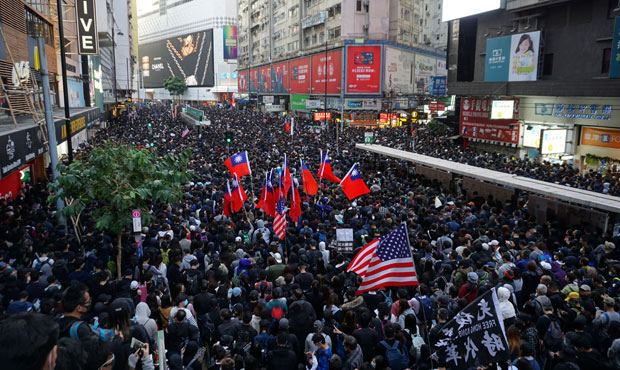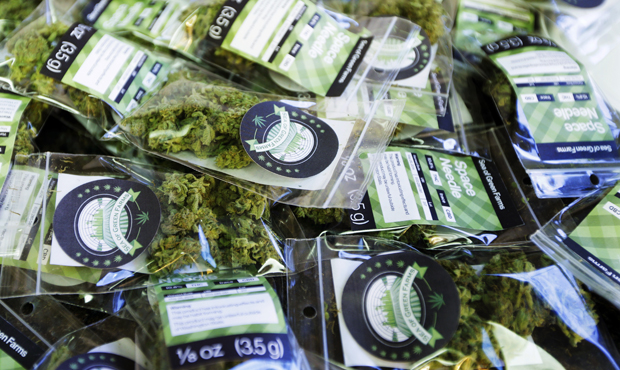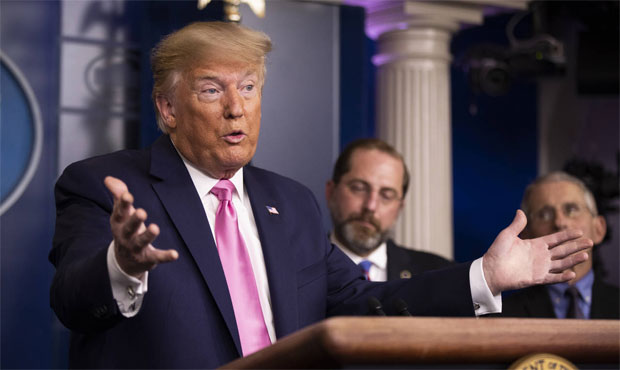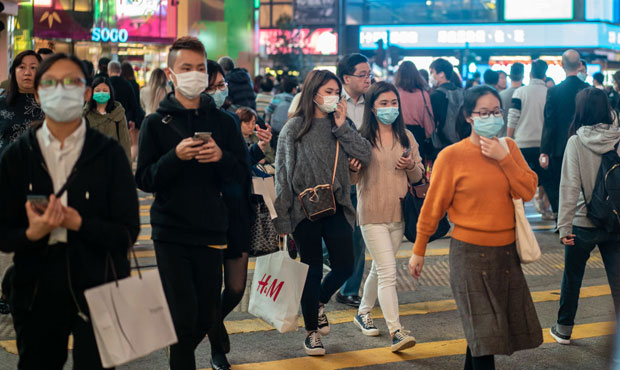Haynes: The world takes an ethical look at questionable China practices
Dec 10, 2019, 6:46 AM | Updated: 7:16 am

More and more protesters are showing up to rallies in Hong Kong. (Alexander Haynes)
(Alexander Haynes)
Alexander Haynes is an aspiring journalist raised in the northwest with a background in investigation and policy. He is a graduate of an internship program at KTSW 89.9 in San Marcos, Texas and will always have a new book recommendation for anyone who asks. He has been reporting on the ground from Hong Kong during the city’s recent protests and time of civil unrest.
Hong Kong’s protests started in June 2019 against proposals to allow extradition to mainland China. Critics feared this could undermine the city’s judicial independence and endanger those critical of mainland China.
Carrie Lam, the Chief Executive of Hong Kong — appointed by China — agreed to suspend the extradition bill, however demonstrations developed to include demands for full democracy and an inquiry into police actions.
The extradition bill was withdrawn in September. Clashes between police and activists have become increasingly violent, with police firing tear gas and rubber bullets without warning and protesters attacking officers and throwing petrol bombs, in recent days.
Most cities in an industrial city of South Asia would appreciate a local park project; a convenient family park that would help the environment and beautify a suburban region. That is, until the city discovers the land set aside for the park is actually a crematorium, several football fields wide with planned chimneys sixty meters high.
This is the reality in the principality of Wenlou in the Guangdong Province of southern China. The people who discovered the plans marched on governmental offices on Nov. 28 and 29.
Police met the protesters and responded just as police responded in Hong Kong: Tear gas and batons. One of the major differences between Guangdong and Hong Kong, however, was the protesters immediately turned to violently flipping cars and firing live fireworks at police.
The police too, responded harsher, having since encircled the town of Wenlou, imposing martial law, and restricting all travel. On Monday, the local government announced they had rescinded the plans for the crematorium – only after police allegedly searched door-to-door for protesters, arresting several people, including one man who dared post on the social media app Weibo regarding the protests.
Haynes: Democracy finally starts to take hold in Hong Kong
The protests in Guangdong are another block of stone falling for China in a recent week of abysmal public relations for the Chinese Communist Party (CCP), set off by Hong Kong’s landslide pan-democratic victory in the District Council Elections. The elections have only emboldened Hong Kong protesters, seeing one of the largest marches in recent months with hundreds of thousands of people (largest estimate 300,000, smallest 100,000) on December 1, and then an 800,000-person march on December 8.
Their appeal for full suffrage, among five other demands demands, has proliferated, as several people stated they were showing up to protests for the first time over the past two weekends.
As the protests in Hong Kong continue to surge, China has grown a knack for official commentary being the equivalent of blatant dismissal. The Chinese economy is beginning to show signs of not only a weak base, but a base entirely fabricated by imagery. Small banks are caving in as monetary policy has dictated an artificial lattice propping up central banks. Corporate debt is increasing to 165 percent of the gross domestic product, while 586 of 4,400 lenders have been labeled “high risk” amidst an increasing number of bank runs.
In Hong Kong specifically, the local government is instituting a fourth round of economic relief measures, while posting the first budget deficit in over a decade. Hong Kong airlines was given five days to save the airlines from being dissolved, and while they have secured a loan and are refusing to lay off staff, remain without a financial plan.
With Hong Kong being the third largest stock exchange, and Shanghai not yet established as a financial capital of the world, a loss for Hong Kong is a loss for China. Earlier speculation had put that the Chinese government and corporations were moving assets to mainland cities to protect capital in the ensuing loss of Hong Kong as a financial capital.
While some money has been shifted, most monetary funds have shifted towards Singapore, not mainland China, a result of the mainland economy showing instability as Hong Kong concurrently nosedives into a recession.
Controversy at Xinjiang camps
Corporations may have to take an ethical look at China as well. Leading national, and now international, cellular and technology firm Huawei was revealed to be involved in Xinjiang concentration camps. Their involvement began in 2014, at a counter-terrorism conference for a “Safe Xinjiang,” and has since spread to providing police in the region with equipment for rounding up Uyghurs and monitoring them in the “re-education” camps.
Xinjiang is reaching Holocaustic levels of surveillance and detainment, with police now sleeping in the same house as family members of those detained, as near as three meters away. Huawei is facilitating the level of monitoring and concentration at the same time they are establishing the first 5G cellular network in China, and worldwide. Most concerns about Huawei’s ethics in the past have been regarding ethics; the Xinjiang documents raise ample sets of new moral quandaries for those financiers with Huawei.
Espionage concerns elsewhere, however, have been ample. The government and individual firms have been caught in the crosshair of international legal cases over the previous weeks. The Verge reported that after the Hong Kong election victories, the app WeChat – popular in South Asia – was banning and deleting users, regardless of borders, of those who were spreading the election results.
Haynes: Future of Hong Kong at center of US trade war with China
In response to leaks from a recent Chinese defector (claiming to interfere in Taiwanese elections), Australia launched an anti-espionage task force with a budget equivalent of $59.6 million USD. Australia’s concern specifically is over efforts of an influential spy being installed in their Parliament.
Further reports also indicate more Chinese spies (250 in all) are operating in Brussels than Russian spies. Brussels is a key headquarters for key EU organisations as well as the head of the NATO office.
Charles Parton, a former British diplomat stated that the espionage in Brussels was only the “far end of the spectrum,” citing more influence in academia and technological espionage. These cases of espionage hit the United States when ex-CIA officer Jerry Chun Shing Lee was sentenced to nineteen years in jail after pleading guilty to conspiring with Chinese spies for the better part of a decade. Eerily, at the same time the key CIA cell in China collapsed.
In San Francisco, Xuehua Edward Peng, former tour operator, plead guilty to receive a deal of four years in prison for being an unregistered foreign asset. Fortunately, all the information he was going to leak was fake, being spread to him by an FBI double-agent.
The spread of China espionage continues to be unraveled at a pace that is astonishingly scary. Chinese interference is especially poignant to those in Hong Kong, many of whom are fearing tactics will only escalate over the coming year. In other regions of the world, many are taking a step back to more carefully monitor the rate of Chinese espionage. Huawei being intrinsically involved with holocaustic tactics in Xinjiang is evident that there is an intricate involvement between major Chinese corporations and the CCP.
As the governmental fabric and secrets begin to fall away from the CCP, the party’s leaders have remained in a mode of full denial. The question then shifts to their internal reaction; more pertinently, will they double down on such tactics? And will that hypothetical doubling-down escalate a financial waning that has been historically tied to over-extended nations?
Naturally, only time and news in the coming weeks, particularly from Hong Kong, will answer those questions. Thus, in that time, the question which will drive the future the most may not be found in the minutia of secret, backdoor dealings; rather, in how the world reacts to the CCP and how China’s citizens choose to react to a master that has undoubtedly become a tyrant.
You can follow Alexander Haynes’ reporting from the streets of Hong Kong on Twitter, at @ACLHaynes – make sure to listen to The Saul Spady Show every morning from 6-9 a.m. on 770 KTTH for these types of stories and more.












